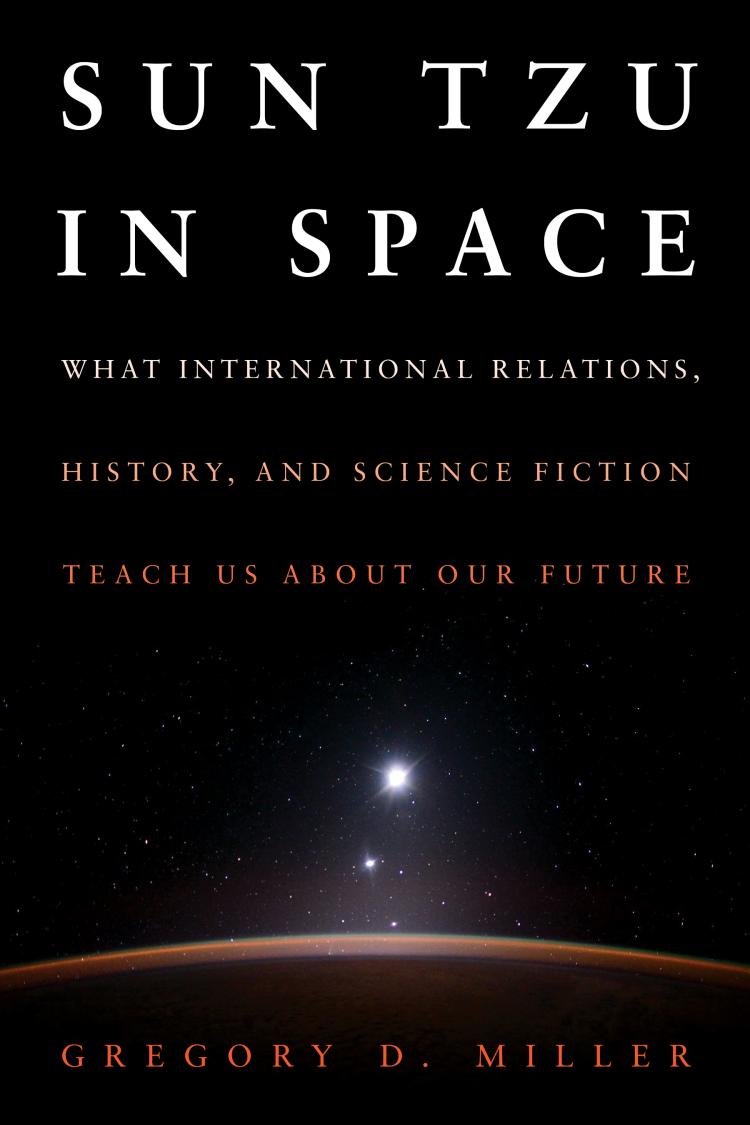Sun Tzu in Space
"What International Relations, History, and Science Fiction Teach us about our Future"
- Subject: Spring 2023 Catalog | Political Science | Aviation & Space
- Format:
Hardcover
- Pages:
376pages
- Illustrations:
8 tables
- Published:
April 15, 2023
- ISBN-10:
1682478459
- ISBN-13:
9781682478455
- Product Dimensions:
9 × 6 × 1 in
- Product Weight:
23 oz
Overview
Sun Tzu in Space provides a novel way of thinking about the future, connecting international relations, history, and science fiction to better understand some of the various paths for future human activities in space. Simultaneously, it provides a way to use science fiction to help students and the public learn about international relations and the cyclical nature of history.
Author Gregory D. Miller uses case studies, history, and foundational international relations concepts to draw big, or at least possible, conclusions about humanity’s future in space. By combining the lessons of science fiction, and the facts of the past, Miller presents possible outcomes with a goal of illuminating where things could go wrong, or wonderfully right, as humans venture forth into space in greater numbers in the in the decades to come.
Author Gregory D. Miller uses case studies, history, and foundational international relations concepts to draw big, or at least possible, conclusions about humanity’s future in space. By combining the lessons of science fiction, and the facts of the past, Miller presents possible outcomes with a goal of illuminating where things could go wrong, or wonderfully right, as humans venture forth into space in greater numbers in the in the decades to come.
About the Author
Editorial Reviews
“This is a serious and erudite survey of international relations theory made fresh. Miller deftly presents leading academic models of global politics and pairs them with model worlds from the masters of speculative fiction in this satisfying and deeply heuristic work.” —Everett C. Dolman, professor of Comparative Military Strategy, USSF West Space Seminar, Air War College, and author of Astropolitik, Pure Strategy, The Warrior State, and Can Science End War?
“Dr. Greg Miller’s Sun Tzu in Space is an essential analysis of international relations theory on the cusp of the new space age. As humanity reaches for the stars and begins the process of colonizing the solar system, Miller speculates on how established world views will guide future politics, economics, and interactions once humans leave Earth. This project is an exceptional analysis of the future of politics and human (and machine) interaction as we reach for the stars. Miller draws from both scholarly international relations theory as well as science fiction to discuss the future of humanity in a new era of exploration.” —Dr. S. Mike Pavelec, professor, Department of Spacepower, Air Command and Staff College
“Sun Tzu in Space is a fresh approach to examining international relations theory using the framework of seminal science fiction literature. The book immediately engages the reader in a fun manner to explore human behavior through seven potential celestial futures. An original and compelling book for teaching international relations theory.” —John J. Klein, author of Understanding Space Strategy: The Art of War in Space; faculty, George Washington University's Space Policy Institute
“An intriguing and unique book. A fun alternative to understanding IR theories and historical analogies. Using science fiction as the basis to projecting long term state capabilities, this book uses academic theories for very long term forecasts to explore possible strategic competition and cooperation in space colonization.” —Mike Fowler, associate professor of Military and Strategic Studies
“Science fiction is rapidly threatening to become astropolitical fact. In Sun Tzu in Space, one of the Space Force’s leading professors explores classic speculative tales with rigorous international relations and military theory to discover remarkable insights into the crises of tomorrow. This book shows our favorite tales are more than just space opera, they’re roadmaps to the future.” —Brent D. Ziarnick, Associate Professor, Air Command and Staff College and author of To Rule the Skies
“This book by Gregory D. Miller provides a fertile ground to have a serious discussion on the various possible political scenarios that we will face in the future if humanity does starts colonizing space. I would recommend Sun Tzu in Space to our Space Force strategists who are focused on international affairs.” —Col Carlos Pérez Méndez, Director Global Partnerships, HQ Space Force
Political Scientist Gregory Miller’s Sun Tzu in Space offers a rather unique approach to divining what might be humanity’s future in outer space. His recipe for exploring potential futures begins, in each of seven chapters, with presentation of a different fictionalized scenario. As a final ingredient in what amounts metaphorically to a hearty meal for hungry minds, he spices each mixture with thoughtfully selected dashes of science fiction. While Sun Tzu in Space offers a substantial quantity of worthwhile food for thought, many readers might find its distinctly academic tone difficult to digest. To give up on finishing, however, would be a mistake.
– Air Force Historical Foundation.




